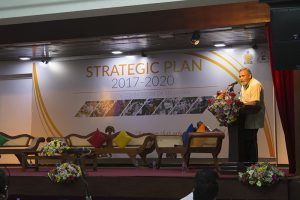
The Constitutional Council, recommended names to the President for appointment to the Election Commission and the Election Commission was established on 13th November 2015.
In keeping with the Universal Declaration of Human Rights and in assuring the people their role in taking part in the government of their country, the newly established Election Commission, saw it as a necessary progressive step to launch a Participatory Strategic Planning (PSP) to formulate the vision, mission, goals and objectives of the Commission and to develop an action plan for four years. Considering the socio-political and religio-cultural changes that have taken place during the past three decades, and understanding the need to adopt a collective vision to drive the establishment forward, the Commission unanimously decided to conduct the Participatory Strategic Planning exercise. The planned process of the exercise included identifying the needs of the community and other stakeholders. This was a significant and extensive exercise as it was conducted at national and district levels to gather information and views and opinions and responses, and analyse them and to formulate an action plan.
The political changes that had taken place after the prolonged armed conflict that ended in 2009, and the space opened for social and political reforms, gave the Commission an opportunity to strengthen the strategic direction of the new Commission and to evolve an effective and efficient way to manage its affairs taking into consideration the dynamics of both the internal and external environments.
Participatory Strategic Planning (PSP) methodology has been identified as an effective management innovation. It is a highly structured and future-oriented management technique that sets the programmes and policy direction of an institution. It was therefore employed to develop the collective vision, mission, goals and objectives of the Commission, encouraging the officials at every level to feel a deeper, more personal commitment in initiating a four year action plan. All officials of the Commission had a place at the table and a voice in the process.
This collaborative planning also helped the internalization of the vision by channeling energy into achieving key strategic goals identified by the officials during the intensive workshops conducted for the purpose. Accepting the differences and minimizing polarization and conflicts, the PSP process was instrumental in indentifying significant organizational change, addressing barriers, and identifying transformational opportunities. In conducting the PSP exercise, the 'critical issue approach' has been selected and applied.
Participatory Strategic Plan (PSP)
DOWNLOAD

